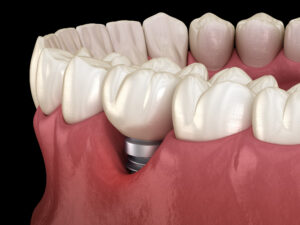
Every person deserves to have a beautiful and healthy smile. However, for people who have lost one or multiple teeth due to injury, disease, or aging, achieving a perfect smile can become a challenge. Fortunately, dental implants offer a reliable and permanent solution to restore your lost teeth and enhance your oral health. In this comprehensive guide, we’ll discuss when you should consider dental implants as an oral rehabilitation option, the benefits, and the process of getting dental implants.
When to Consider Dental Implants:
Dental implants involve artificial tooth roots that are carefully inserted into your jawbone to support replacement teeth or bridges. If you’ve lost one or more teeth due to accidents, gum disease, or injury, dental implants may be the most effective way of restoring your smile, improving your mouth’s functionality, and boosting your confidence. To determine whether you’re a good candidate for dental implants, your dentist will evaluate your oral health, the condition of your remaining teeth, and the strength and density of your jawbone.
The Benefits of Dental Implants:
Dental implants have several advantages over other tooth replacement options such as bridges or dentures. Firstly, dental implants mimic natural teeth in their structure and function, which makes them feel and behave like the rest of your teeth. Secondly, dental implants are strong and durable, and they can last for a lifetime if you maintain good oral hygiene. They also prevent bone loss in the jaw, which can occur when teeth are missing, and it helps maintain healthy facial structure. Finally, dental implants offer improved comfort, functionality, and aesthetics, which can significantly enhance your quality of life.
What’s involved in getting dental implants:
The process of getting dental implants involves several steps and may take a few months to complete. Your dentist will first perform a thorough examination of your oral health and determine if there are any underlying dental issues that need to be addressed before implant surgery. Next, the implant is placed surgically into your jawbone, where it fuses with the natural bone to provide a stable base for your replacement teeth. Finally, once the implant has properly attached to the bone, your dentist will attach custom-made crowns, bridges, or dentures to restore your natural bite and smile. Throughout the process, your dentist will closely monitor you to ensure the best possible outcome.
How to take care of your dental implants:
After the implant procedure is completed, it is crucial to maintain proper oral hygiene to ensure the longevity of your dental implants. Regular brushing, flossing, and rinsing are essential to keep your implants free from harmful bacteria that could lead to gum disease or implant failure. Additionally, avoid chewing hard or sticky foods that could damage your implants and visit your dentist regularly for checkups and cleanings.
Dental implants provide a long-lasting and reliable way to restore your smile and improve your overall health. If you have missing teeth or struggle with dental issues, speaking with your dentist is the first step to determining if dental implants are the right oral rehabilitation option for you. Remember to properly care for your dental implants to ensure your beautiful smile lasts a lifetime.
